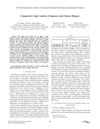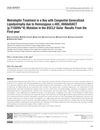 24 citations,
July 2019 in “Cochrane library”
24 citations,
July 2019 in “Cochrane library” Some treatments like methotrexate with prednisone might help juvenile morphea, but more research is needed to confirm.
 23 citations,
January 2014 in “Molecular Therapy”
23 citations,
January 2014 in “Molecular Therapy” Applying a special DNA plasmid to the skin can make it thicker and stronger.
 18 citations,
March 2014 in “Current Pharmaceutical Biotechnology”
18 citations,
March 2014 in “Current Pharmaceutical Biotechnology” Metformin helps regulate menstrual cycles, induce ovulation, and improve pregnancy outcomes in women with PCOS.
 11 citations,
December 1987 in “Aesthetic Plastic Surgery”
11 citations,
December 1987 in “Aesthetic Plastic Surgery” The document concludes that the hCG protocol may help in obesity treatment and could be scientifically justified, but more research is needed.
 8 citations,
January 2020 in “Skin Pharmacology and Physiology”
8 citations,
January 2020 in “Skin Pharmacology and Physiology” Caffeine improves hair growth, thickness, and reduces shedding.
 6 citations,
February 2018 in “PLOS ONE”
6 citations,
February 2018 in “PLOS ONE” Insect wax, especially its policosanol content, may help hair regrow by changing hair follicle phases and increasing nutrient supply.

Chinese and Japanese bloggers discuss different topics and have varying opinions, reflecting cultural differences.
 2 citations,
October 2020 in “BioMed Research International”
2 citations,
October 2020 in “BioMed Research International” Phaeodactylum tricornutum extract helps hair follicle cells grow by activating the ERK1/2 pathway.
 2 citations,
December 2013 in “Veterinary dermatology”
2 citations,
December 2013 in “Veterinary dermatology” Three dogs with a rare skin condition improved with treatment.
 2 citations,
November 2012 in “InTech eBooks”
2 citations,
November 2012 in “InTech eBooks” The document concludes that sex hormones are crucial for mammalian reproduction, health, and behavior, and require more research for therapeutic use.
 1 citations,
June 2022 in “JCRPE”
1 citations,
June 2022 in “JCRPE” Metreleptin treatment significantly improved metabolic health in a boy with congenital generalized lipodystrophy.
 1 citations,
September 2020 in “Cochrane library (CD-ROM)”
1 citations,
September 2020 in “Cochrane library (CD-ROM)” The analysis aims to identify the most effective and safest treatments for alopecia areata.
 1 citations,
July 2020 in “Dermatology”
1 citations,
July 2020 in “Dermatology” Photobiomodulation helps reduce pain, lessen inflammation, heal wounds, and can be used in skin treatments. It also boosts hair growth in women with hair loss and may help fight microbes and prevent respiratory issues in COVID-19.
 1 citations,
November 2015 in “Lʹvìvsʹkij klìnìčnij vìsnik”
1 citations,
November 2015 in “Lʹvìvsʹkij klìnìčnij vìsnik” Correcting trace element imbalances may help reduce alopecia areata symptoms.

Drinking sweetened tea and poor sleep habits may increase the risk of hair loss in women.

Drinking sweetened tea and poor sleep increase the risk of hair loss in women.

Drinking sweetened tea and poor sleep habits increase the risk of hair loss in women.

Drinking sweetened tea and late bedtimes increase the risk of hair loss in women.

Drinking sweetened tea and late bedtimes increase the risk of hair loss in women.

The trial aims to understand how obesity and lifestyle affect circadian rhythms in people with schizophrenia and bipolar disorder.
 January 2024 in “Acta Facultatis Medicae Naissensis”
January 2024 in “Acta Facultatis Medicae Naissensis” Cosmeceuticals are important for managing skin issues during the COVID-19 pandemic.
 December 2023 in “Jurnal Penelitian Pendidikan IPA”
December 2023 in “Jurnal Penelitian Pendidikan IPA” PRP heals pockmarked skin better than salmon DNA serum.
 October 2023 in “Peer review”
October 2023 in “Peer review” PRP is a safe and effective treatment for hair loss.
 August 2022 in “International journal of research in pharmacy and chemistry”
August 2022 in “International journal of research in pharmacy and chemistry” Teak is a durable, termite-resistant wood with medicinal benefits.
 April 2021 in “Han'gug miyong haghoeji/Journal of the Korean society of cosmetology”
April 2021 in “Han'gug miyong haghoeji/Journal of the Korean society of cosmetology” Eating raw cheonggukjang improves scalp hair in middle-aged women.
 January 2018 in “Springer eBooks”
January 2018 in “Springer eBooks” Gender affects hair and scalp characteristics, with differences in hormone responses, graying patterns, and trace metals.
 November 2017 in “Elsevier eBooks”
November 2017 in “Elsevier eBooks” PCOS is a genetic disorder affecting women's reproductive health, with treatments focused on symptoms like insulin resistance and fertility.
 January 1953 in “The Lancet”
January 1953 in “The Lancet” Alopecia areata's causes are unclear, treatments exist but relapses are common.
 November 2020 in “Acta Scientific Women's Health”
November 2020 in “Acta Scientific Women's Health” Low vitamin D levels can significantly contribute to hair loss, especially in women aged 35-45. Correcting these levels early may help prevent and treat this condition.

Dermal stem cells help regenerate hair follicles and heal skin wounds.






























